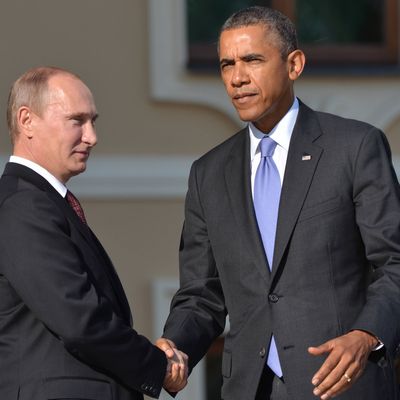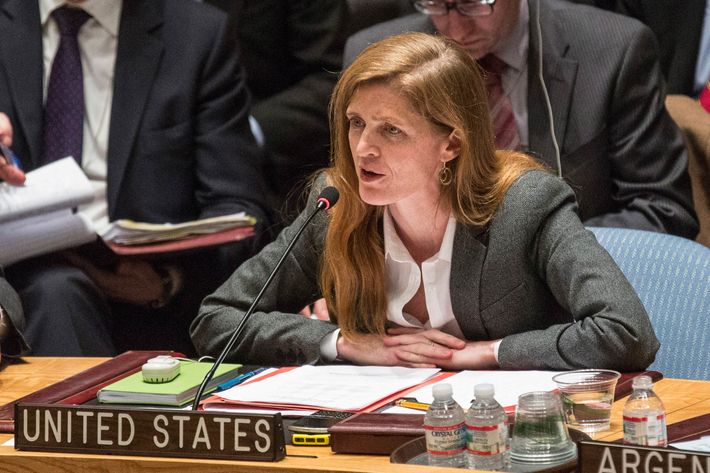
The onset of a new foreign policy crisis offers yet another opportunity to attempt to categorize President Obama’s foreign policy orientation. Fred Kaplan, writing for Politico, offers up one answer: Obama is a Realist. Kaplan intends the description as a compliment. I think Kaplan’s exercise in ideological pigeonholing is far too narrow, which I also mean as a compliment.
For those who don’t follow foreign policy jargon, Realism is a term for a school of thought that’s distinct from realism, though its adherents tend to consider the two things more or less the same. Big-R Realists dismiss the role of values in foreign policymaking, believing that states ought to (and almost always do) follow their interests, even if they delude themselves or others that they have some grander moral purpose, like human rights or democracy. The ultimate modern expression of Realism would be Richard Nixon and Henry Kissinger, who tolerated a bloodbath by Cold War ally Pakistan, and who once took the Realist philosophy to its reduction ne plus ultra by commenting privately, “And if they put Jews into gas chambers in the Soviet Union, it is not an American concern.” The ultimate expression of the opposite of Realism, idealism, might be post-9/11 George W. Bush, declaring war on evil everywhere, pledging “the ultimate goal of ending tyranny in our world.”
The Democratic version of idealism emerged during and after the Clinton administration, when a small cadre of liberal foreign policy activists came to view the successful intervention to protect Bosnia and Kosovo as the model for a new kind of humanitarianism. Some of the advocates for this school of thought, like Hillary Clinton and Samantha Power, joined Obama’s foreign policy team.

Kaplan argues that they have been marginalized within the administration, and deems Obama admirably ruthless and clear-eyed in his willingness to pursue narrow foreign policy interests without being sidetracked by sentimentalism:
[Obama] rarely hectors foreign leaders about their internal affairs, at least in public. He suffers no ideological hang-ups about negotiating with dreadful rulers or sworn enemies, such as Iran, for the sake of national-security interests. To ease America’s way out of Afghanistan, he has cozied up to Central Asian autocrats and tolerated Pakistan’s duplicity. With almost clinical detachment, he has reassessed U.S. relationships in East Asia, embracing authoritarian regimes in Myanmar and Vietnam to promote trade and check an expansive China .…
He seems unmoved by the triumphalism that animated George W. Bush’s foreign policy, in part because he sees the bloody, futile legacy it left in the sands of Iraq—but also because it’s just not his style.
Syria presents an ambiguous test of Obama’s ideology. On the one hand, he did decide against intervention even in the face of a humanitarian catastrophe. On the other hand, Obama clearly did not make this decision on Realist grounds that the United States shouldn’t care about the massacre of Syrian civilians, but rather on the small-r realist grounds that we lacked any practical recourse. (I lean toward sharing this analysis, but it’s hard to hold a strong view in the absence of the kind of intelligence only the administration itself could access.) A prudential judgment that intervention was unlikely to work in this case, but that he’d be open to undertaking it if it could, is very different than believing it was not America’s business. Obama gave up trying to pass cap and trade after 2010, but that hardly puts him in the same category as an ideological opponent of cap and trade.
Kaplan’s ideological construct falls apart completely when it comes to Libya. Here is a case where the United States had no hard interests at stake, and yet chose to intervene, siding with idealists like Clinton, Rice, and Power. Kaplan presents Obama’s decision to intervene as a modulated strike that was “commensurate with our limited interests.”

But the United States had no “interest” in preventing Muammar Gaddafi from slaughtering civilians, let alone in toppling his regime. Indeed, the geopolitical ramifications cut in the reverse direction. Idealists feared a slaughter would halt the momentum of the Arab Spring, a regional uprising that threatened regimes that were either able to work with the United States in some way, like Syria, or were American clients, like Egypt. Even Gaddafi himself had become sufficiently amenable to American interests that he could talk long into the night with John McCain.
A true realist would have been happy to let Gaddafi crush his domestic foes. Indeed, at the time it was being debated in 2011, Kaplan fretted, “There is also something worrisome about the final minutes of Obama’s speech, which took flight into lofty sentiments about America’s pledge of a helping hand “for all those yearning for freedom around the world.” The Libya example alone cracks apart the case – no Realist would ever have committed American military power to save civilians in the service of a social revolution obviously unsettling to American interests.
The reason Obama has had liberal humanitarians like Power and Susan Rice on his foreign policy staff since has campaign, and throughout his presidency, is that he shares their ideological goals within the limits of what is practically attainable. Obviously, Obama is no George W. Bush. On the other hand, nobody else is George W. Bush, either. Most American presidents fall somewhere on the continuum between Bushian crusading moralism and Nixonian ruthlessness. Obama does, too.






























